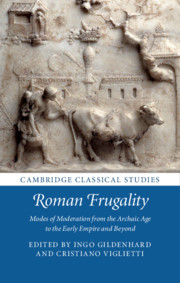Book contents
- Roman Frugality
- Cambridge Classical Studies
- Roman Frugality
- Copyright page
- Contents
- Figures
- Contributors
- Acknowledgements
- Note on Translations
- Abbreviations
- Introduction
- Chapter 1 ‘Frugality’, Economy and Society in Archaic Rome (Late Seventh to Early Fourth Century BCE)
- Chapter 2 From Licinius Stolo to Tiberius Gracchus: Roman Frugality and the Limitation of Landholding
- Chapter 3 Frugality as a Political Language in the Second Century BCE: The Strategies of Cato the Elder and Scipio Aemilianus
- Chapter 4 Smallholding, Frugality and Market Economy in the Gracchan age
- Chapter 5 Frugalitas, or: The Invention of a Roman Virtue
- Chapter 6 Frugality, Building, and Heirlooms in an Age of Social Mobility
- Chapter 7 From Poverty to Prosperity: The Recalibration of Frugality
- Index Locorum
- General Index
- References
Chapter 4 - Smallholding, Frugality and Market Economy in the Gracchan age
Published online by Cambridge University Press: 26 June 2020
- Roman Frugality
- Cambridge Classical Studies
- Roman Frugality
- Copyright page
- Contents
- Figures
- Contributors
- Acknowledgements
- Note on Translations
- Abbreviations
- Introduction
- Chapter 1 ‘Frugality’, Economy and Society in Archaic Rome (Late Seventh to Early Fourth Century BCE)
- Chapter 2 From Licinius Stolo to Tiberius Gracchus: Roman Frugality and the Limitation of Landholding
- Chapter 3 Frugality as a Political Language in the Second Century BCE: The Strategies of Cato the Elder and Scipio Aemilianus
- Chapter 4 Smallholding, Frugality and Market Economy in the Gracchan age
- Chapter 5 Frugalitas, or: The Invention of a Roman Virtue
- Chapter 6 Frugality, Building, and Heirlooms in an Age of Social Mobility
- Chapter 7 From Poverty to Prosperity: The Recalibration of Frugality
- Index Locorum
- General Index
- References
Summary
This chapter reconsiders the transformation of smallholding in the late second century BCE in relation to developments within Rome’s political economy in the decades after the Second Punic War, which had profound repercussions on economic activity broadly conceived, perhaps even triggering an ‘economic revolution’. The discussion focuses chiefly on landholding during the Gracchan Age (133–120 BCE), with a specific emphasis on the recurrence of frugal ideals in the political debate arising from the Gracchan reforms and the role of smallholdings in the face of significant changes brought about by the emergence of large market-oriented estates and related developments, such as the rise in the price of land, increase in the number of slaves, the consequences of imperial plunder and tax-farming and the management of the grain supply and subsidies. The chapter pays equal attention to the ideological framework that defined smallholding in the Gracchan age and its practical consequences.
Keywords
- Type
- Chapter
- Information
- Roman FrugalityModes of Moderation from the Archaic Age to the Early Empire and Beyond, pp. 213 - 236Publisher: Cambridge University PressPrint publication year: 2020

